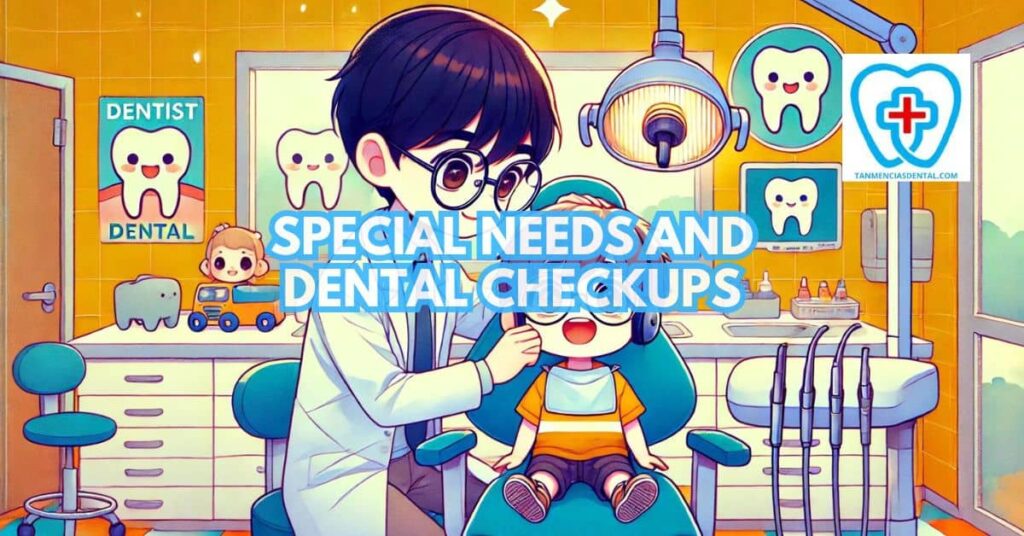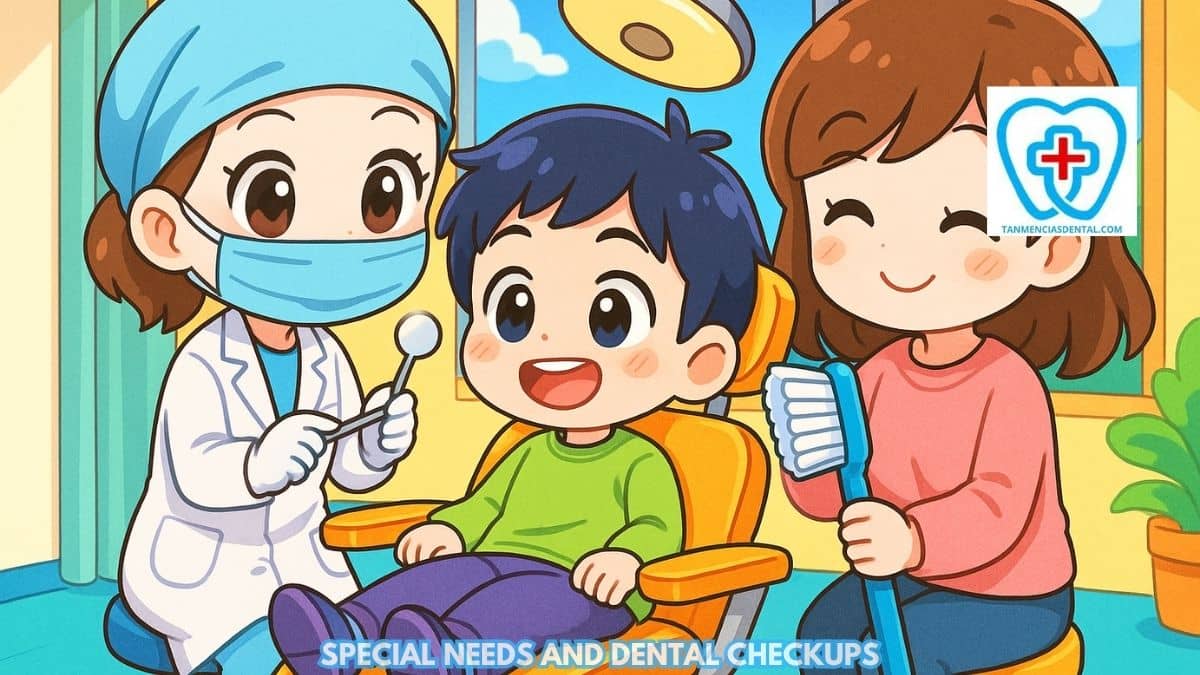Dental care for people with special needs requires extra planning, understanding, and teamwork.
Each patient may have different physical, developmental, or sensory challenges that affect how they receive dental treatment.
This is why special needs and dental checkups must focus on comfort, safety, and clear communication.
Dentists who care for these patients often adjust their techniques, equipment, and schedules to make visits easier and more effective.
When dental professionals, caregivers, and healthcare providers work together, they help ensure that every person with special needs can maintain a healthy mouth and a positive experience at the dentist.
1. The Importance of Pediatric Dentistry in Special Needs Care
The role of pediatric dentistry in the care of children with special needs cannot be overstated, as these dental professionals possess the comprehensive training and empathy needed to address both the dental and emotional aspects of care.
They are experts not only in treating dental problems but also in employing strategies to prevent tooth decay, ensuring each child’s dental health is given top priority.
Understanding the unique challenges faced by these children, pediatric dentists create a warm, welcoming environment that significantly reduces fear and anxiety, fostering a positive view of dental visits that can last a lifetime.
Collaborating closely with parents and caregivers, they craft care plans that are tailored to the individual needs of each child, combining treatment with education on proper oral hygiene practices.
This proactive approach to dental care, focused on prevention and early intervention, is crucial in mitigating future dental problems and promoting overall wellness.
Pediatric dentists also play a key educational role, equipping families with the knowledge and tools needed to maintain good dental health outside the dental office.
Their dedication to the dental health of children with special needs ensures these young patients have access to the specialized care necessary for a healthy smile and a healthier future.
🦷 How Recycled Toothbrushes Support Zero-Waste Lifestyle Goals
2. Identifying a Special Needs Dentist: Qualifications and Skills
A special needs dentist is not only trained in dental care but also in approaches to accommodate the wide spectrum of special needs, including those related to cognitive, sensory, and physical challenges.
Such dentists typically undergo additional training beyond dental school, focusing on techniques and communication strategies to serve patients with special needs effectively.
The ability to create a sense of ease and trust with patients who may have heightened anxieties or unique behavioral needs is a key skill.
Identifying a dentist with these qualifications often involves looking for certifications or memberships in professional associations dedicated to special-needs dentistry.
Recommendations from healthcare providers, patient reviews, and specialized dental clinic directories can be valuable resources for finding a dentist with the right qualifications and skills.
🦷 What is a Good Alternative to a Toothbrush for Maintaining Oral Hygiene?
3. Coordinating Medical Care Before Dental Visits
Before a dental checkup, patients with special needs often need their dentist and doctor to share information about their health.
This helps the dentist understand any conditions, such as heart problems, seizures, or breathing issues, that might affect treatment.
Reviewing all current medications is also important, as some can cause dry mouth or increase the risk of bleeding.
The dental team can plan the best time for the appointment based on when medicines are taken to keep the patient safe and comfortable.
If needed, the dentist may ask for medical clearance or take extra steps, such as using antibiotics or adjusting how the patient sits, to prevent health problems during the visit.
🦷 How Organic Toothbrushes Contribute to a Sustainable Oral Care Routine
4. Tailoring Dental Care to Meet Unique Needs
Dental care for individuals with special needs requires a customized approach that considers the patient’s comfort and accessibility at every step.
This might involve the use of specialized dental equipment, modification of traditional dental techniques, or the incorporation of technology to improve communication and understanding.
Dentists skilled in special needs care are adept at modifying their treatment plans to accommodate the sensory sensitivities or physical limitations of their patients.
Flexibility in appointment scheduling and procedure pacing is often necessary to match the patient’s ability to tolerate dental work.
Through personalized care strategies, dental professionals can significantly enhance the oral health outcomes and overall dental experience for patients with special needs.
🦷 Can You Brush Your Teeth With Dentures In?

5. Comfortable Dental Office Environments for Special Needs Patients
Dental offices designed with the special needs of patients in mind focus on creating a calming and accessible environment.
From sensory-friendly waiting rooms that minimize overstimulation to exam rooms equipped for wheelchair access, every aspect of the design considers patient comfort and ease.
Dentists may also utilize tools and technology that reduce noise or physical discomfort, catering specifically to those with sensory sensitivities.
Staff training in understanding and compassion plays a crucial role in reinforcing a supportive atmosphere.
These intentional design and service choices can make a significant difference in a patient’s ability to successfully receive dental care.
🦷 How Long to Wait After Brushing Teeth to Use White Strips?
6. Pediatric Sedation Dentistry: Ensuring Comfort and Safety
For many patients with special needs, the prospect of dental treatment can be overwhelming, making sedation dentistry a valuable option for ensuring comfort and safety.
Pediatric sedation dentistry utilizes a variety of techniques, from mild sedatives to general anesthesia, tailored to the patient’s specific needs and the complexity of the dental procedures.
Dentists trained in sedation have a deep understanding of how to administer these options safely, considering the patient’s medical history and individual health requirements.
This approach not only facilitates a more relaxed dental experience but also allows for more complex or multiple procedures to be completed in fewer visits.
Close monitoring and advanced preparation ensure that sedation is used effectively, minimizing risk and maximizing patient comfort.
🦷 How to Choose the Best Toothpaste to Whiten Teeth with Braces
7. Special Accommodations for Successful Dental Checkups
Providing special accommodations during dental checkups is crucial for meeting the unique needs of patients with special needs.
This might include offering appointments at times of the day when the patient is most calm and cooperative, allowing for longer visit durations to avoid rushing, and providing clear explanations or visual aids to prepare the patient for what to expect.
Dental offices might also offer the opportunity for the patient to visit the office before the actual appointment, helping to familiarize them with the environment and reduce anxiety.
In some cases, accommodations may involve adjustments to the dental equipment or techniques used to ensure the patient’s comfort and cooperation.
These thoughtful accommodations are essential for creating a positive dental visit experience and encouraging ongoing oral health care.
🦷 Is It Normal for Your Teeth to Wiggle with Braces?
8. Communication Strategies in Special Needs Dentistry
Effective communication is key to providing quality dental care to patients with special needs, involving both verbal and non-verbal methods to ensure understanding and comfort.
Dentists and their staff may use simplified language, visual aids, or even technology-assisted devices to facilitate clear communication.
It’s important for dental professionals to listen actively to the patient and their caregivers, valuing their input and adapting their approach based on the feedback received.
Training in alternative communication techniques, such as sign language or the use of pictorial schedules, can also be beneficial in engaging with patients who have communication barriers.
Establishing a rapport and a sense of trust through patient-centered communication can significantly reduce anxiety and increase cooperation during dental procedures.
🦷 Hate Brushing Teeth? The Daily Struggle is Real
9. The Role of Caregivers in Dental Checkups
Caregivers have an important part in helping patients with special needs feel calm and prepared for dental visits.
Before the appointment, they can remind the patient to brush their teeth and explain what will happen during the checkup in a way the patient understands.
Caregivers often bring comfort items or visual guides that help the patient feel safe while sitting in the dental chair.
They also share important details about the patient’s health, behaviors, and what makes them anxious or relaxed.
During the visit, caregivers can help by offering reassurance and helping the dental team understand the patient’s reactions.
Their steady presence can make the environment feel more familiar and supportive.
Caregivers often help the patient practice brushing and other oral care routines at home to maintain healthy habits between visits.
By working closely with the dentist, caregivers make each dental checkup smoother and more positive for the patient.
🦷 Why Poor Brushing With Braces Can Lead to Serious Dental Problems

10. Navigating Dental Services for the Special Needs Child
Accessing and navigating dental services for a child with special needs can be daunting, but several strategies can ease the process.
Parents and caregivers should start by seeking out dental practices that explicitly welcome patients with special needs or have pediatric dentists with the appropriate training and experience.
Networking with other parents, support groups, or health care providers can provide recommendations and insights into finding the right dental services.
It’s also beneficial to discuss the child’s specific needs with the dental office ahead of time, allowing for proper preparation and accommodations.
Making use of the resources that are available, such as those that special needs advocacy organizations offer, can aid caregivers in understanding their options and rights to accessible dental care.
🦷 Is Coconut Oil Good to Brush Your Teeth With?
11. Advanced Dental Procedures and Sedation Options
For patients with special needs, some dental conditions require advanced procedures that are more involved than regular cleanings or fillings.
These may include tooth restorations, orthodontic adjustments, or oral surgery that demand special preparation and care.
Patients with conditions like cerebral palsy may need additional support in the dental chair to help them stay comfortable and safe during treatment.
Dentists carefully review the patient’s medical history and physical abilities before choosing the best approach for care.
Sedation options can include mild relaxation medicine for simple work or full anesthesia for complex or lengthy procedures.
Each method is chosen to reduce fear, pain, and movement while allowing the dentist to work efficiently.
The dental team closely monitors breathing, heart rate, and comfort throughout the procedure to maintain safety.
By using advanced dental techniques and well-planned sedation, patients with special needs receive complete care that protects both their oral health and overall well-being.
🦷 Basic Dental Needs in Marikina
12. Interdisciplinary Collaboration: A Holistic Approach to Special Needs Dental Care
Effective dental care for individuals with disabilities requires more than just the expertise of dental professionals; it thrives on the synergy of an interdisciplinary team.
By collaborating with pediatricians, occupational therapists, and psychologists, dental providers can create a comprehensive care plan that addresses the unique challenges faced by each patient.
This collaboration is particularly crucial when treating children with special needs who may experience anxiety or have difficulty cooperating during dental visits.
Pediatricians can provide insights into a child’s medical history and current health status, while occupational therapists can offer strategies to help children manage sensory issues during dental procedures.
Psychologists can work with children and their families to reduce anxiety and improve cooperation, making dental visits less stressful for everyone involved.
Together, these professionals can identify and address oral health problems early, preventing more severe issues in the future.
This teamwork not only enhances the quality of care but also fosters a supportive environment that prioritizes the overall well-being of the patient, ensuring that both dental and non-dental health needs are met cohesively.
🦷 Your Go-To Family Dentist in Marikina
👨⚕️ Conclusion
Dental care for the special needs community is an essential part of comprehensive health care, requiring a thoughtful and personalized approach from dental professionals, caregivers, and the community as a whole.
By embracing the unique needs of these patients and committing to providing accessible, comfortable, and specialized dental care, we can make significant strides in improving their oral health and overall well-being.
It involves not only the technical aspects of dental treatment but also the creation of a supportive and understanding environment.
As we continue to advocate for and implement practices that accommodate these unique needs, the goal of inclusive and effective dental care for individuals with special needs becomes more attainable.
Ultimately, the collective effort to understand and address these needs underscores the importance of compassion and empathy in healthcare, enriching the lives of patients and caregivers alike.
😊 Self-Promotion
At Tan-Mencias Dental Clinic in Parang, Marikina City, we’re dedicated to providing you with a comfortable and caring dental experience like no other.
Our friendly team is eager to address all your dental needs and questions, ensuring you leave with a smile brighter than when you came in.
For convenience and ease, feel free to reach out to us in whichever way suits you best: give us a call at 9171451074, drop us a message through our Facebook page, or use our website’s contact form.
We’re here to make your dental care journey as smooth and pleasant as possible.
Visit us today and discover why we’re the trusted choice for dental care in Marikina City!
❔ FAQs
1. Why is regular dental care important for people with special needs?
Regular dental care helps prevent cavities, gum disease, and pain that can affect eating and speaking.
People with special needs may have a higher risk of dental problems due to medications, diet, or motor challenges.
Consistent checkups help dentists find and treat problems early.
Good oral health also supports better overall health.
2. How can parents or caregivers prepare a special needs patient for a dental visit?
Caregivers can talk about the visit in a calm and positive way and show pictures of the dental office or dentist.
Scheduling a short visit before the first appointment can help reduce fear.
Bringing comfort items, such as headphones or a favorite toy, can also help.
Explaining what will happen step by step can make the experience easier to understand.
3. What should caregivers tell the dentist before an appointment?
Caregivers should share the patient’s medical history, medications, and any allergies.
It helps to describe behaviors or sensitivities that may affect the visit.
Letting the dentist know what helps the patient feel calm or what might cause stress allows the dental team to plan better.
This information ensures that care is safe and personalized.
4. What kinds of dental treatments are safe for patients with special needs?
Most routine dental treatments are safe when planned with the patient’s health in mind.
Dentists can adjust their methods or use sedation if needed to keep the patient comfortable.
Preventive treatments like cleanings, sealants, and fluoride applications are especially helpful.
A dentist trained in special needs care will always choose the safest and most effective option.
5. How often should patients with special needs have dental checkups?
Most patients should visit the dentist every six months, but some may need more frequent visits.
The dentist will decide based on the patient’s health, medications, and oral hygiene habits.
Regular checkups help track changes in the mouth and catch small problems early.
Ongoing care supports long-term comfort and healthy smiles.

